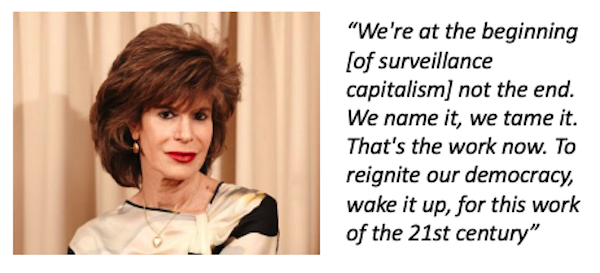Behavioural Futures and Microchip Parties
Almost everything we do online produces a digital record. When we make a call, send a message, buy a pizza or go for a jog our data is recorded and captured. Surveillance capitalism captures this personal behavioural data, translates it into predictions and sells those predictions into new markets that trade exclusively in behavioural futures1. Is this scary and Orwellian and a precursor to internalized social controls, or merely continuing progress in the relentless drive towards a new age of “dataism”2.
Regardless of the political or technological viewpoint, surveillance capitalism is already enmeshed in our daily lives by means of smartphones, watches, fitness trackers and other ubiquitous information technologies. Our digital data has become a critical raw material and is analysed and sold to advertisers and used to enhance digital services, increase our digital participation and used to augment the existing government surveillance apparatus.
Enterprises, through similar mechanisms, can monitor workers every action3. There have even been a handful of isolated cases of firms hosting ‘microchip parties’45, to encourage employees to implant a tracker under their skin. Amazon carefully monitors their warehouse workers and if inefficiencies are detected they can be automatically cautione6. UPS drivers face similar scrutiny on their delivery routes7.
Within the political realm, Bloomberg reported that Facebook adapted its surveillance capitalism mechanisms to directly influence voters in the 2017 German national elections, controversially resulting in the AfD party getting a surprising increase in votes8. In Brazil, political commentators argue that the winning candidate in the last presidential elections owed his victory in part to sophisticated use of social media910. However, it is worth noting that in the latter two cases mentioned, there was no indication that Facebook’s motivations were political. As discussed in a later blog post, it was merely a side effect of their relentless pursuit of ever-increasing user engagement.

Shoshana Zuboff, 201911
The techniques of surveillance capitalism are largely subliminal and shockingly effective in the manipulation of social behaviour11. Surveillance capitalism’s primary focus may be within the commercial sphere, but like traditional advertising, it can and is being applied to other spheres of influence. In order to understand surveillance capitalism, it is helpful to first consider its origins.
Next: The Origins of Surveillance Capitalism
-
Zuboff, S., 2015. Big other: Surveillance Capitalism and the Prospects of an Information Civilization. J. Inf. Technol. 30, 75–89. https://doi.org/10.1057/jit.2015.5 ↩︎
-
Harari, Y.N., 2016. Homo Deus: A Brief History of Tomorrow. Harvill Secker. ↩︎
-
Sørensen, C., 2011. Enterprise Mobility: Tiny Technology with Global Impact on Work [WWW Document]. URL https://www.dawsonera.com/readonline/9780230306202 (accessed 1.15.19). ↩︎
-
Agence France-Presse, 2018. Why thousands of people in this country got microchip implants - party [WWW Document]. South China Morning Post. URL https://www.scmp.com/news/world/europe/article/2145896/thousands-people-sweden-get-microchip-implants-new-way-life (accessed 4.28.19). ↩︎
-
Mills, E., Press, A., 2017. Tech company holds “chip party” to implant microchips in more than 40 workers. The Telegraph. ↩︎
-
Bort, J., 2019. Amazon’s warehouse-worker tracking system can automatically pick people to fire without a human supervisor’s involvement [WWW Document]. Bus. Insid. URL https://www.businessinsider.com/amazon-system-automatically-fires-warehouse-workers-time-off-task-2019-4 (accessed 4.28.19). ↩︎
-
Goldstein, J., 2014. To Increase Productivity, UPS Monitors Drivers’ Every Move [WWW Document]. NPR.org. URL https://www.npr.org/sections/money/2014/04/17/303770907/to-increase-productivity-ups-monitors-drivers-every-move (accessed 4.28.19). ↩︎
-
Silver, V., 2017. The German Far Right Finds Friends Through Facebook. ↩︎
-
Leahy, J., 2018. FT Surging support for Brazil’s Lula da Silva unnerves markets [WWW Document]. Financ. Times. URL https://www.ft.com/content/e20c2888-a67f-11e8-8ecf-a7ae1beff35b (accessed 4.28.19). ↩︎
-
Leahy, J., Schipani, A., 2018. FT How social media exposed the fractures in Brazilian democracy [WWW Document]. Financ. Times. URL https://www.ft.com/content/8c08654a-c0b1-11e8-8d55-54197280d3f7 (accessed 4.28.19). ↩︎
-
Zuboff, S., 2019. The Age of Surveillance Capitalism: The Fight for a Human Future at the New Frontier of Power. Profile Books. ↩︎
